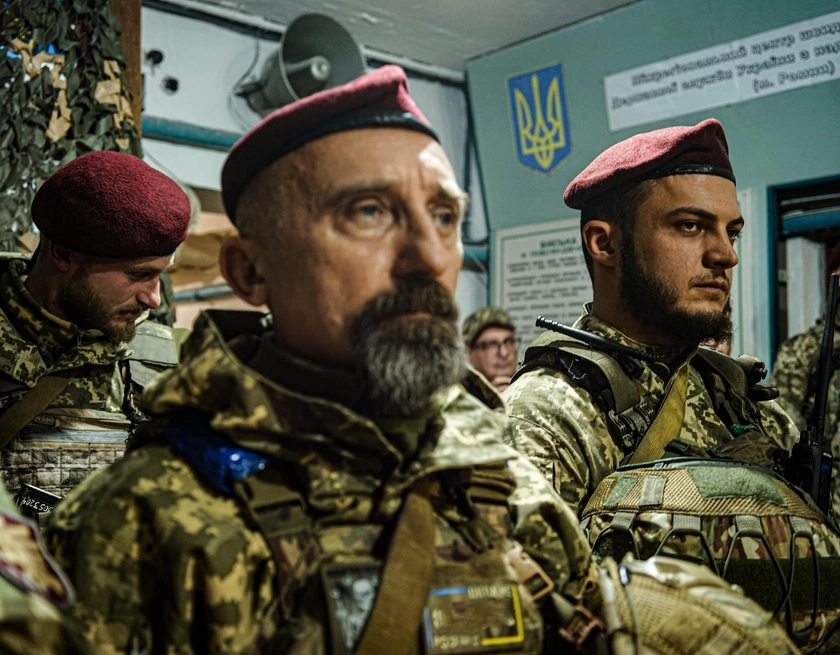"It was a nightmare, an apocalyptic movie," says Yulia, recollecting her first impressions of Mariupol when she arrived in June.
JOIN US ON TELEGRAM
Follow our coverage of the war on the @Kyivpost_official.
"The streets you've walked all your life, the places where your friends lived, everything you used to know is destroyed, turned into ashes. It broke my heart.”
In June of this year, most people were seeking a way out Mariupol after Russia laid waste to the city and then set about installing an occupational administration, a still unconvincing attempt to officially bring it into the orbit of the Kremlin.
Yet, Yulia and her husband Oleksandr were attempting to return to their home city, on a grim mission to rebury Oleksandr’s parents, Vasily and Taisia, who had died there in March.
Here, she tells their story for the first time.
Buried in the backyard
Russia’s invasion of Ukraine inflicted medieval conditions on a 21st century democracy.
“They died of cold and hunger,” says Yulia. “Can you imagine such a thing in our day and age? They were buried in front of the house, basically, ‘in the backyard.’”
Yulia and Oleksandr found out about their deaths from a Viber chat group set up by people who had escaped Mariupol but still received information from those who stayed behind. The group told them.
The streets you've walked all your life, the places where your friends lived, everything you used to know is destroyed, turned into ashes. It broke my heart.
Two months later members of the group contacted the couple once again and warned them that the house was being prepared for demolition in late May or early June.

Americans Fighting in Ukraine Criticize Trump’s Treatment of Zelensky, Embrace of Russia
"Imagine our feelings,” says Yulia. “We realized that if it were to be demolished, we would never find them and would never be able to bury them in a humane way, so we started to think about how to get there.”
The couple faced one very obvious problem – how to get from Ukrainian Kyiv to Russian-occupied Mariupol.
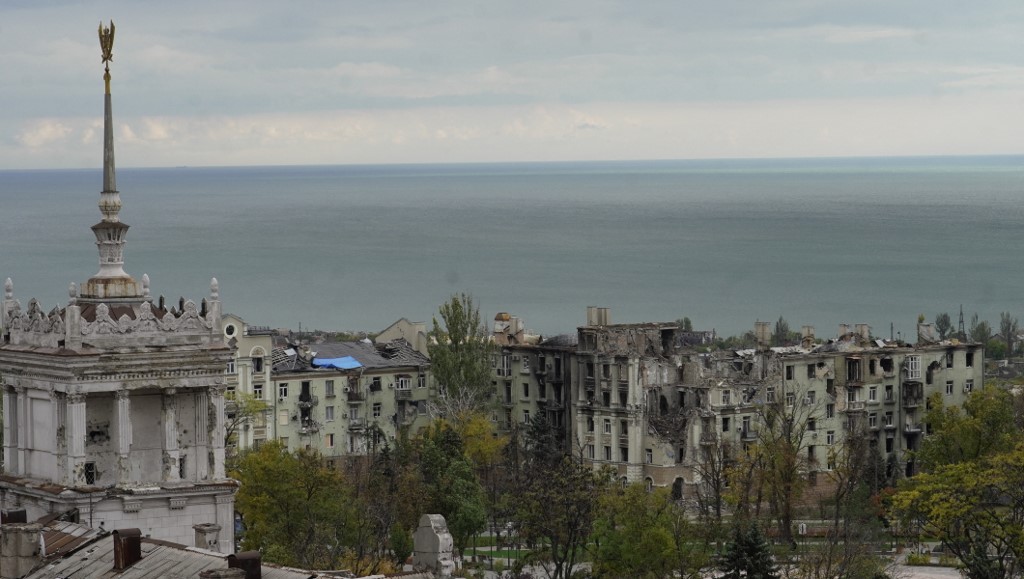 A picture taken on October 27, 2022 shows the Russian-controlled Azov Sea port city of Mariupol in southeastern Ukraine.
A picture taken on October 27, 2022 shows the Russian-controlled Azov Sea port city of Mariupol in southeastern Ukraine.
Heavy fighting in the Zaporizhzhia region close to Mariupol ruled out a direct route so their only option was to travel through Russia itself, which was a terrifying prospect further complicated by the fact Oleksandr was a male of military age and could not leave Ukraine due to martial law.
Yulia would have to go alone.
Lonely roads and checkpoints
"I drove through Poland, the Baltic States, then through Russia - Rostov, Novoazovsk. There is a checkpoint in Novoazovsk," Yulia says.
Yulia passed the checkpoint quickly. She was neither filtered nor interrogated, although she says men were severely treated there - interrogated, smartphones checked. Women, especially those with a Mariupol residence permit, were allowed to pass quickly.
They died of cold and hunger. Can you imagine such a thing in our day and age? They were buried in front of the house, basically, ‘in the backyard.’
"But the attitude towards us was generally very arrogant,” she says. “For some reason, they believed that all Mariupol residents are drug addicts and alcoholics, and idlers.
"They asked me why I was going to Mariupol. Well, this is my house, I replied. Why can't I go to my native Mariupol?"
Returning home
After an arduous three-day journey, Yulia arrived in Mariupol to find the house in which Oleksandr’s parents died had been heavily damaged when a bomb fell through the roof and exploded.
"And when you go up to the apartment...it's creepy,” she says. “You know that there used to be a sofa here, a chair there, people used to live here for decades.
“They had been trying to make the place better and more comfortable. They glued wallpaper and bought new furniture. But there was nothing left.”
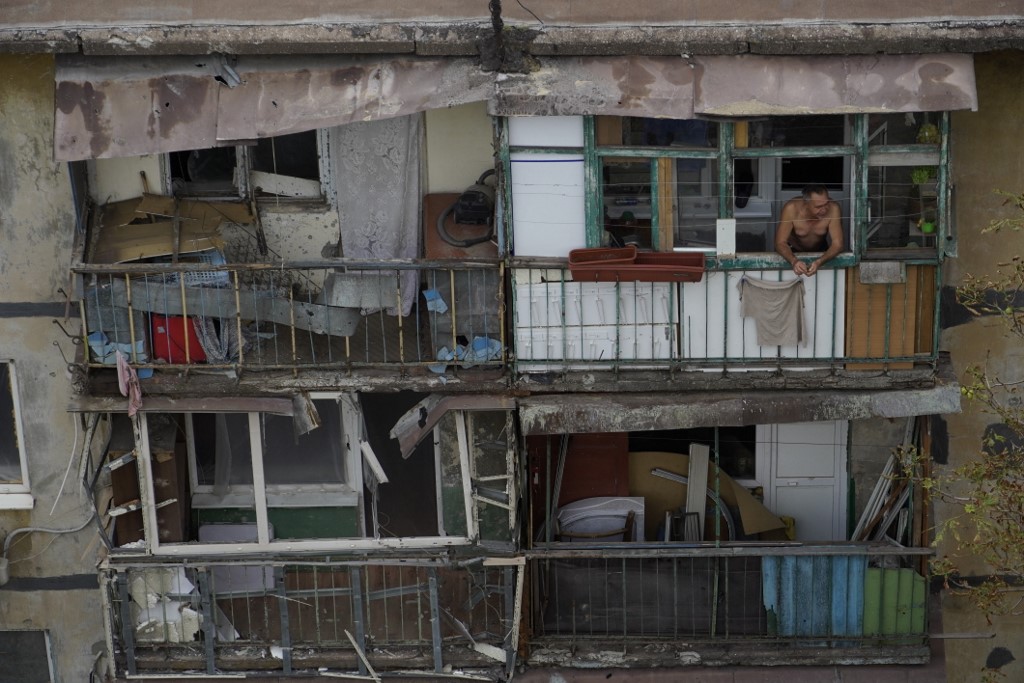 A view of the city of Mariupol on September 15, 2022. STRINGER / AFP
A view of the city of Mariupol on September 15, 2022. STRINGER / AFP
Yulia's parents' house was also severely damaged. All the upper floors had collapsed from the bombing, forming a deep crater inside the house.
"There was no wall in the bedroom,” she says. “The balcony, along with the wall, disappeared somewhere. There were no ceilings or floors in the living room.
“Most of all, I felt sorry for the books and photos left there. Everything was gone. Everything fell along with the floor and slabs."
People who, for whatever reason, did not leave the city and stayed in this
house live in the hallway near the elevator shaft.
"People cook on bonfires and live in the hallways near the elevator. Since
the apartments were destroyed, with the windows broken - the hallway has become a place to warm up a bit. They live in a commune, all together. Every
day they try to get food somehow."
And when you go up to the apartment...it's creepy. You know that there used to be a sofa here, a chair there, people used to live here for decades.
Residents of Mariupol in the main eat food items from humanitarian aid kits. But the
kits are very scarce: a packet of porridge, sugar, a bottle of sunflower oil, stew, and
condensed milk. Grocery stores in the city don't exist, the only places ones they can
get some food, except for humanitarian aid, are farmer's markets. But the
prices are sky-high, even though people are broke, living there without
any income.
Buried with a bottle
Even worse than the condition of the buildings, was what happened to Oleksandr’s parents after they died - details Yulia learned from their neighbors.
"They (neighbors) could not bury Sasha's father for a very long time because of the incessant shelling,” she says. “He was just lying in the playground where he died for a long time, not buried."
Oleksandr's mom, Taisia, died a little later. Neighbours managed to bury both of them in shallow graves – the ongoing shelling meant they didn’t have time to dig deeper – and put pieces of paper with the names and dates of death in bottles which were buried with them.
“Eleven people were buried in the yard of the house, including Oleksandr's parents,” says Yulia. “Those who had relatives were buried by relatives wherever possible. And those people whose relatives were not found were buried in unmarked graves. There were a lot of such burials there.”
They (neighbors) could not bury Sasha's father for a very long time because of the incessant shelling. He was just lying in the playground where he died for a long time, not buried.
"Graves with wooden crosses. No name, no date. Previously, we had a cemetery outside the city, far beyond the city. It has grown very much. It has reached the city borders. There are a lot of fresh graves there and there is one new cemetery in the city itself. I don't know how many people have died there, but it's creepy. There are a lot of graves."
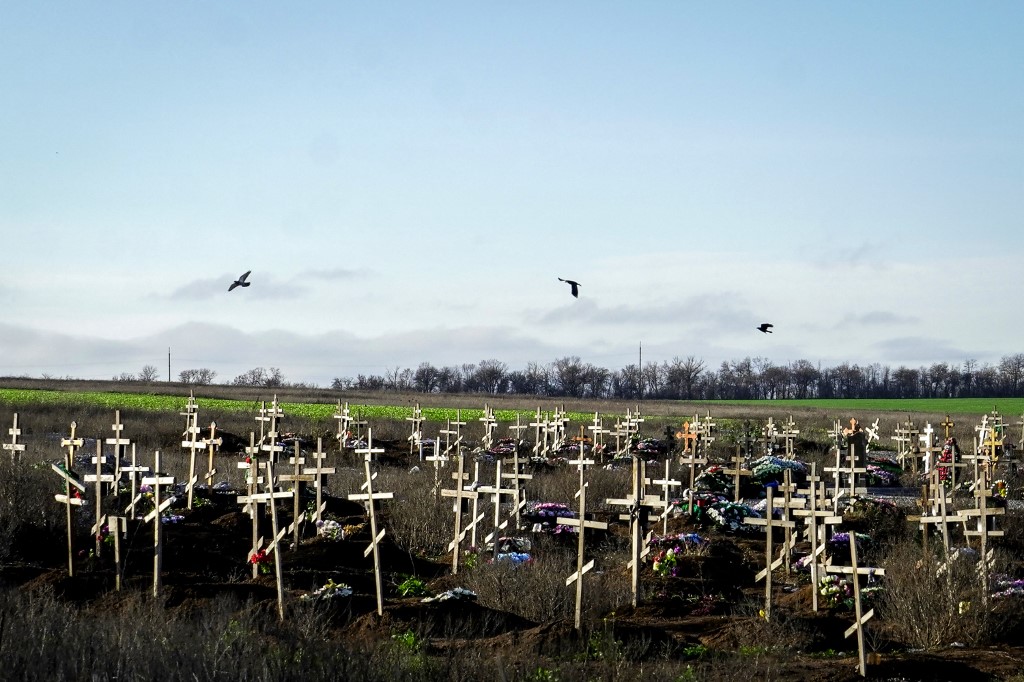
Cemetery in Mariupol. Photo by AFP.
The occupation authorities, when it got warmer, began to rebury the bodies. They were forced to. Otherwise, said Julia, it could end up an epidemiological catastrophe. It was hot in the city, and the bodies were not extracted from the rubble, buried at a shallow depth.
The exhumations and reburials carried out by the occupation authorities were very slow. Yulia realized that if she did not speed up the process, the house would be demolished, with the bodies not being exhumed.
Those who had relatives were buried by relatives wherever possible. And those people whose relatives were not found were buried in unmarked graves. There were a lot of such burials there.
"People living in that house were extremely, I would say, delighted when I came there and started to accelerate the process," Yulia says. "We are Mariupol residents. We have a lot of acquaintances there. Classmates, relatives, friends. We found a forensic expert through friends. She helped us to carry out the exhumation despite everything."
Corpses removed by trucks
Recently, on Russian TV or in the Russian segment of social networks, there have been a lot of videos and information showing that Mariupol is being actively rebuilt. However, visiting her hometown, Yulia didn't notice anything suggesting that Mariupol was being restored in any way possible.
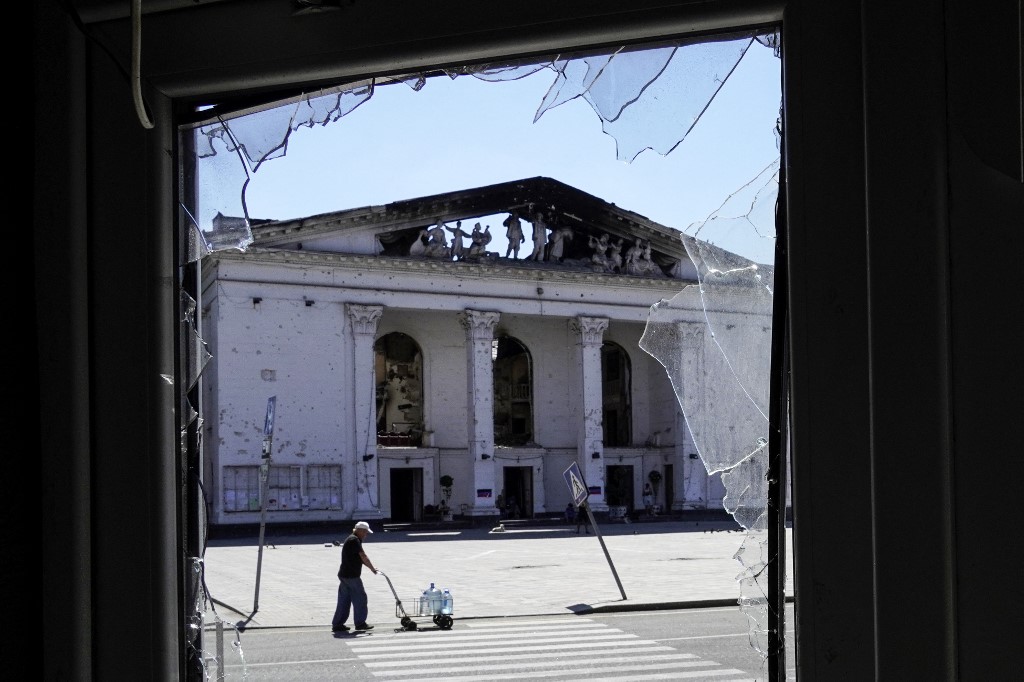
A man carries the bottles with drinking water past the partially destroyed Mariupol drama theatre in the city of Mariupol on July 3, 2022.
"People said that the occupation authorities were inspecting houses, making lists of which ones could be repaired and which ones were supposed to be demolished. They promised that they would repair it. They said that the work would begin in two weeks but they never came back."
Back in June, occupation authorities were actively dismantling the rubble - in order to hide the traces of their war crimes.
"The drama theater where a lot of people died was being dismantled. Locals were not allowed there. They (Russians) fenced it with a big wall and took out a lot of corpses. They were literally taken out by trucks."
The drama theater where a lot of people died was being dismantled. Locals were not allowed there. They (Russians) fenced it with a big wall and took out a lot of corpses. They were literally taken out by trucks.
Everything in the city stolen
Yulia says that Russian occupiers looted severely. They were trying to steal whatever was possible. They even dismantled playgrounds. Scrap metal was also exported from factories.
Equipment, computers from schools.
"We also had a new clinic in the city with a lot of modern, expensive medical equipment. There was a very good diagnostic center," Yulia says, adding that all medical equipment was stolen and relocated to Donetsk.
People cook on bonfires and live in the hallways near the elevator. Since
the apartments were destroyed, with the windows broken - the hallway has become a place to warm up a bit.
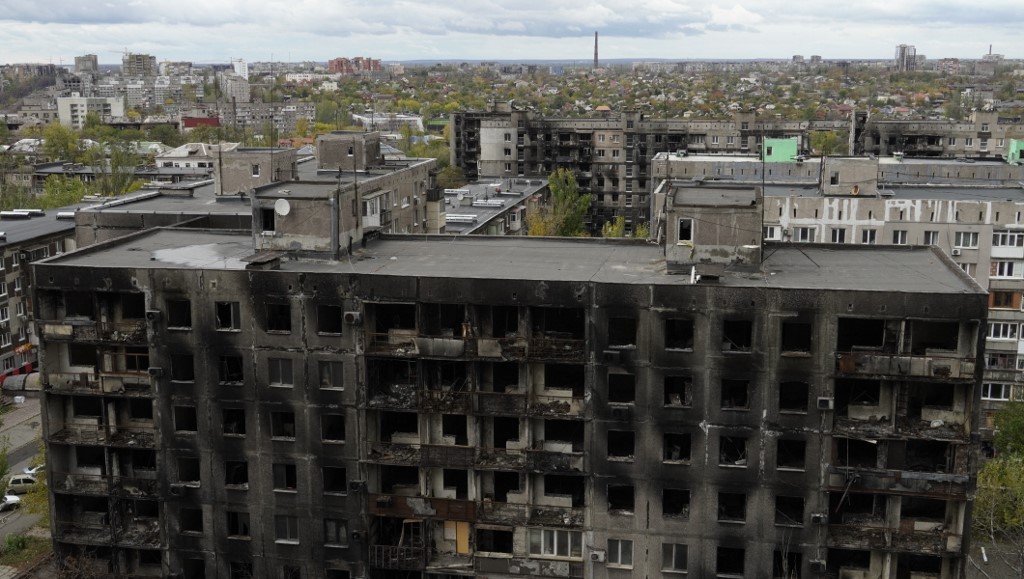 Residential area in Mariupol. Photo by AFP.
Residential area in Mariupol. Photo by AFP.
The road back home
Deep down, Yulia was afraid of being kept in Mariupol, literally not being allowed to go back to Kyiv. She realized it sounded insane, but one could expect anything after the atrocities conducted by Russian forces in Mariupol. Luckily, she managed to leave the city without any complications. Now she is planning to return to her hometown after the Ukrainian victory.
You can also highlight the text and press Ctrl + Enter







